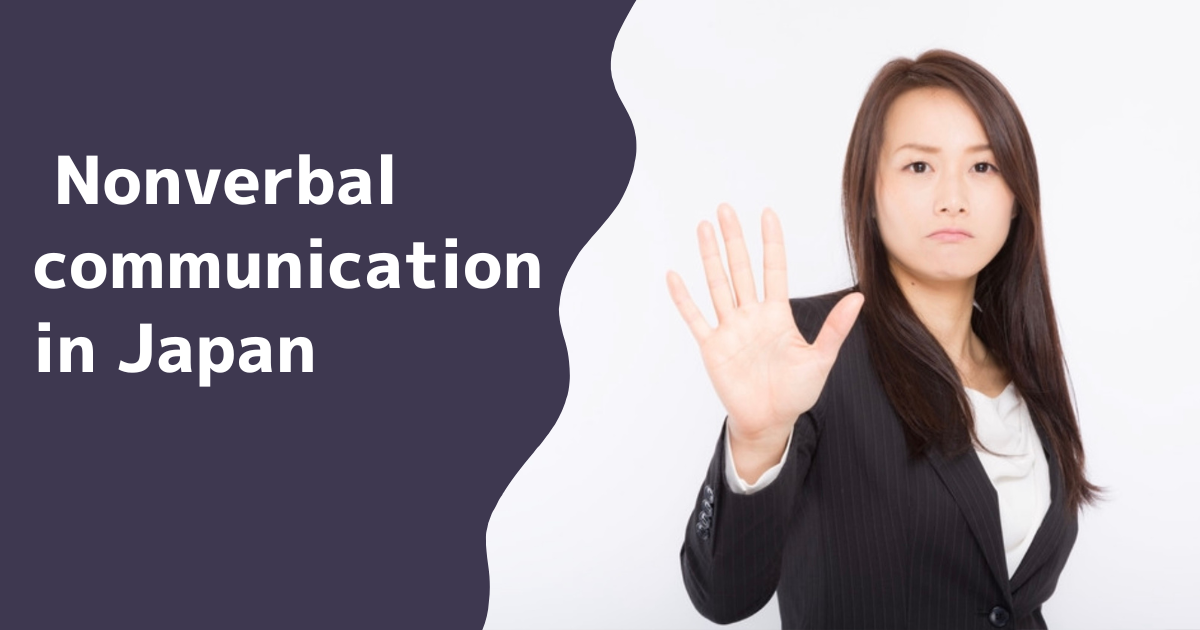When you have a chance to communicate with Japanese people you may find that Japanese people are not decisive, and don’t tell their opinions.
Then you could be puzzled about what on earth are they thinking.
I am 100% pure Japanese, and I also consider that we Japanese people use a lot of nonverbal communication, and I’d like to introduce the following matters in this article.
-Nonverbal communication in Japan
-Japanese people’s gestures and expressions to tell their real intentions
-Say what Japanese people are not intended to say.
-How to get along with Japanese people
After reading this article, I hope you will understand Japanese people’s way of thinking and know how to have successful relationships with them, especially in terms of business.

Let me introduce about myself.
I am Hiro from Tokyo, Japan, born and raised here.
I have working experience in Japanese companies (logistics and manufacturing) for almost 10 years, so I well understand Japanese people’s nonverbal communication culture.
Nonverbal communication in Japan

Nonverbal communication has an important role in Japan because they usually hesitate to strongly tell their opinions and always see other people’s ideas or public opinions even if they stick to their ideas.
Also, people’s real intentions and what they say on the surface is often different.
Therefore, non-Japanese people may feel confused to what Japanese people really consider.
Furthermore, Japanese people often hope other people notice Japanese people’s real intentions without saying anything.
As a result, nonverbal communication among Japanese people is often used to show their true intentions.
The peculiar Japanese indecisive communication style has been made because Japan is an island country and there is no experience of being invaded by another country except for the US temporarily after the Second World War, and through stable agricultural work with the same ethnic people, homogeneity and uniformity had been cherished.
As a result, considering other people’s ideas or opinions is more emphasized than their own opinion and people tended to use more nonverbal communication to express their intentions.
Japanese people’s gestures and expressions to tell their real intentions

Japanese people often use certain gestures or expressions to show their intentions instead of verbal communication and I’d like to introduce some of them.
Start to see their watch or smartphone
When Japanese people are discussing something with others and they want to finish the conversation immediately, they often see their watch without saying anything.
If the person you are talking to starts to see the watch, you should finish the conversation quickly otherwise the person could possibly be frustrated to talk with you more.
Starting to watch smartphones is similar to seeing their watch, and especially if Japanese people think boring, they start to watch smartphones during the conversation.
If you are talking with a Japanese friend and he/she starts to see his/her watch or smartphone, you possibly should finish the conversation.
Click their tongues
When Japanese people are really angry about something, they click their tongues to express anger to other people.
Usually, Japanese people are afraid of tongue-clicking people who seem really angry and they want to be away immediately.
If you are with Japanese people, you should never click your tongue, otherwise they misunderstand you are furious about something and they start to be scared of you unless you really want to intimidate other people.
Utter an “su” sound when they are thinking

If you ask anything to Japanese people, they sometimes start to say the “su” sound from their mouths.
That means they need time to think about the answer to your question, so if they start to make ”su” sound, please give them time to think.
Above those are just example and there are a lot of nonverbal expressions among Japanese people.
Say what Japanese people are not intended to say.

Japanese people often say what they aren’t intended to say on purpose such as follows.
Ask “Are you not busy now?”
When you communicate with Japanese people for a while and suddenly they say “Are you not busy now?”, those Japanese people wish to finish the conversation with you right now (not caring about your next schedule at all).
They are not courageous to finish the conversation with other people even if they are busy and instead, they ask you that question to let them pay attention to time.
Start to praise your list watch
Japanese people (especially Kyoto people) sometimes praise your list watch on purpose when they want to finish a conversation with you immediately (Even if they are not interested in your watch at all).
The reason for praising your watch is because they want you to pay attention to the time by seeing your watch.
Say “your kids are energetic”
Japanese people sometimes praise kids’ parents for how energetic they are.
However, it could imply how noisy or naughty their kids are.
They sometimes aren’t willing to scold their kids or parents for their noises instead they praise the kid’s behaviours in order to let the parents have attention to their kids.
Not only above examples, there are a lot of ways to say what they are not intended to say on purpose.
How to get along with Japanese people

You now realized how indecisive and collectivistic Japanese people are and wondered how to get along with them and have a successful relationship with them.
Please check their facial expressions and voice tones carefully.
Japanese people often use nonverbal communication or say what they are not intended to say, so what you can check is their facial expressions and voice tones which don’t usually tell a lie.
If their face or voice is unwilling though they tell positive things to you, they totally think different things in their mind.
For example when you have a meeting with your Japanese business partners and you suggest something, please check their faces and voice tones not only what they say.
Then you could possibly notice if they want to agree or not.
Also, you should know that Japanese people often make vague answers when they want to reject your suggestion.
because they are not courageous to refuse it and they even consider it rude to reject it.
For instance, if you suggest having dinner with Japanese friends and they possibly vaguely answer yes, but they often are not willing to decide date or place if they actually wanted to refuse it. (then they possibly end up cancelling at the last minute with an apology)
Thus please don’t trust Japanese people’s vague answers.
Conclusion
In this article, I explained nonverbal communication in Japan.
I hope you understand how Japanese people use nonverbal communication and hope you will get along with them after knowing their tendency.
Thank you for reading my article till the end.



コメント Comment